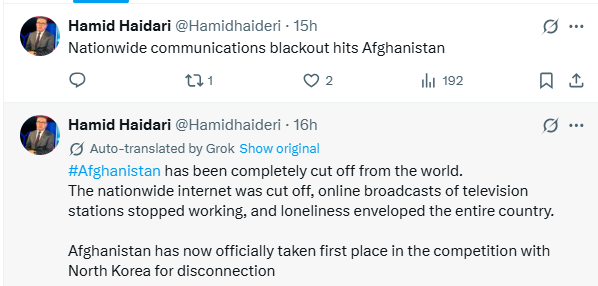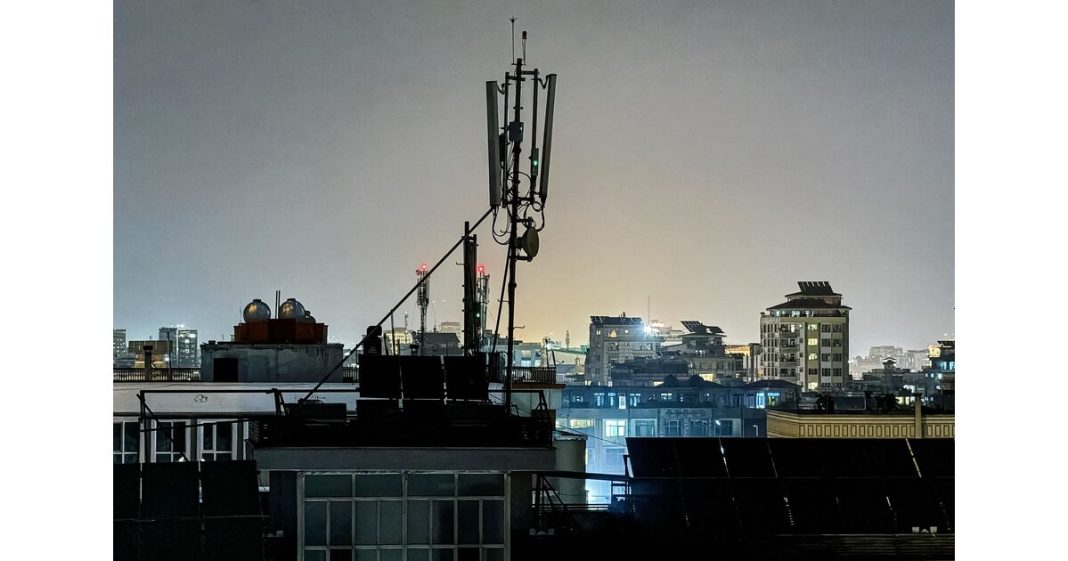The entire Afghanistan has been plunged into a nationwide blackout of telecommunication networks, including 3G and 4G Internet services, by the Taliban government, weeks after it began serving fiber-optic Internet connections. The country is currently experiencing a total Internet blackout, according to Internet watchdog NetBlock. International news agencies say that they have lost contact with their offices in the capital, Kabul. Mobile, Internet, and satellite TV have also been severely disrupted across Afghanistan.
⚠️ Update: #Afghanistan is now in the midst of a total internet blackout as Taliban authorities move to implement morality measures, with multiple networks disconnected through the morning in a stepwise manner; telephone services are currently also impacted pic.twitter.com/AlB6Tum8Dp
— NetBlocks (@netblocks) September 29, 2025
Afghanistan Plunged Into Digital Darkness
Internet and mobile telephone services were down across Afghanistan on Tuesday, residents and monitoring services said, but the Taliban administration offered no immediate explanation. In the past, the Taliban have voiced concern about online pornography, and authorities cut fibre-optic links to some provinces in recent weeks, with officials citing morality concerns.
Internet connectivity in Afghanistan was flatlining around the 1% mark, said NetBlocks, an international internet access monitoring organisation. Connectivity was cut in phases on Monday, with the final stage affecting telephone services, which share infrastructure with the Internet, NetBlocks said in an email to Reuters. Private channel Tolo News, which warned viewers of a disruption to its services, said authorities had set a one-week deadline for the shutdown of 3G and 4G internet services for cell phones, leaving only the older 2G standard active.
Cloudflare Radar, a global internet traffic monitor, said that Kabul, the capital, suffered the sharpest drop in internet connectivity, followed by the western city of Herat and Kandahar in the south. Strictures ordered by the Taliban leadership, based in Kandahar, have grown increasingly hardline.
The Taliban have yet to give an official reason for their shutdown. A Taliban official stated that the telecom shutdown would remain in effect until further notice. TOLO News, a privately owned Afghan news channel, told people to follow its social media pages for updates as it expected disruptions to its televisions and radio networks. Moreover, flights from Kabul airport have also been disrupted, the local media reported.
According to Flight Tracking Service Flight Radar 24, at least 8 flights scheduled to depart from or arrive at Kabul International Airport on Tuesday have been cancelled. Diplomatic officials in Afghanistan have told the international news agencies that the Internet cut could affect banking and e-commerce systems nationwide.
Several people in Kabul have told the international news agency that their fiber-optic Internet had stopped working towards the end of the working day, around 17 local time. Many people will not notice the impact of the Internet shutdown until Tuesday morning, when banking and other services are due to resume.
Read more: Release of Prisoners: Afghan-Taliban & Trump begin a new relationship?
Fiber-optic cables transfer data super fast and are used for much of the world’s Internet. For weeks, Internet users in several provinces of Afghanistan had been complaining about either slow Internet access or no connectivity. Several residents have reported that their businesses and lives have been severely affected by the Internet cuts.
Many analysts believe that the internet has been shut down to cut off the information flow in and out of Afghanistan, lacking technology to filter the content like China and Iran, hence, the shutting down of the fibre-cable system is the only option.
The Taliban turned off the fiber-optic internet all over Afghanistan, and this has caused big problems.
How does the internet work in the country, and what is now affected? pic.twitter.com/JJECZTZp7i
— Lotfullah Najafizada (@LNajafizada) September 29, 2025
Afghanistan Now Like North Korea?
Hamid Haidari, former editor-in-chief of Afghan news channel 1TV, said on Monday that “loneliness enveloped the entire country” after the shutdown. “Afghanistan has now officially taken first place in the competition with North Korea for [internet] disconnection,” he said on X.

While there are no stated official reasons for the internet blackout, earlier this month, Taliban officials warned that they would cut off internet access across the country to prevent immoral activities. Meanwhile, the governor of northern Balkh province, Haji Zaid, said in a statement that an alternative system will be established within the country for essential needs.
The Taliban severed internet access to prevent anyone from documenting the transfer of thousands of foreign fighters out of Bagram to other terrorist camps — apparently to placate the U.S. during ongoing negotiations. Use satellite imagery. Document this movement. Wake up the…
— Sarah Adams (@TPASarah) September 29, 2025
He did not clarify, however, what was meant by immoral activities. Activists believe that this shutdown will worsen the devastating consequences for Afghanistan, which is already reeling with a humanitarian crisis that has only worsened since the Taliban takeover of power in 2021.
Taliban have pushed and implemented various Islamic-based Sharia laws, including the ban on girls from attending schools beyond grade 6. Many were relying on online classes provided by educators abroad or by charitable organizations. With the internet cut off, these opportunities are now under threat.
This month, authorities stopped women working for the United Nations from entering its offices. Earlier, women were banned from many lines of employment and girls from attending high school. The Taliban have said they respect women’s rights in line with their interpretation of Islamic law.
Earlier this month, they removed books written by women from the country’s university teaching system as part of the new ban, which has also outlawed the teaching of human rights and sexual harassment.
With Additional Inputs from GVS South Asia Desk














